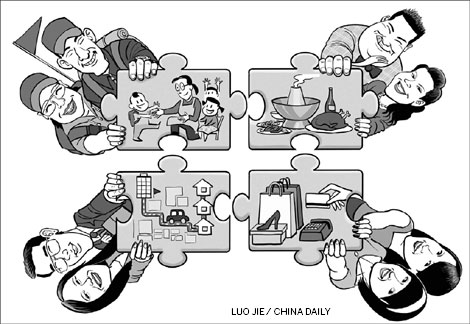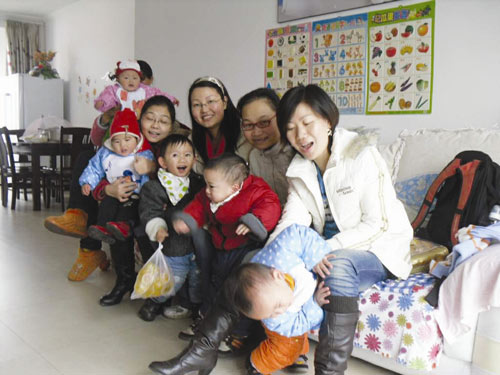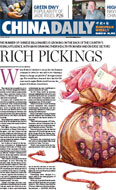Society
Sharing the burden
Updated: 2011-03-15 07:55
By Xu Lin (China Daily)

Young Chinese are finding the answer to rising prices and increasing urban isolation is a new way of leveraging the Internet and getting together. Xu Lin reports.
Five toddlers queue up with toys in their hands, as two young women minister to them. One wipes their faces with a towel, before the other applies cream. This is no scene from a kindergarten, but a common sight in Wang Xiaojun's house. The 30-year-old stay-at-home mom in Wuhan, Hubei province, is one of many post-80s moms who pinyang, or indulge in shared caring.
Under this, one or several moms take turns to look after their kids on weekends in one of their homes.
|
|
Wang set up her pinyang QQ group in November and soon had 182 members from areas near Optics Valley, in Wuhan.
Besides their regular pinyang, that usually involves six moms and six kids, the women also meet once or twice a week, for a visit to places such as amusement parks.
Wang says she decided to pinyang to broaden her circle of friends and find playmates for her son.
"I like to socialize but I had few opportunities to mix with people after my son's birth," she says.
Before she established the group, she only knew her neighbors. But now she has made friends with more than 100 moms and learned more about child rearing.
"The kids are of the same age and they have fun together. Also, we moms are more than happy to communicate with each other," she says.
The group has roughly the same number of stay-at-home and working moms, she says.
They also pin'gou (group-buy) things like clothes, toys and snacks, and enjoy bargains such as buying cotton-padded clothes for 20 yuan ($3.03) as against the market price of 60 yuan.
"Pin'gou can save us a lot of money. Even if there aren't enough people to get a discount, we can still share the cost of delivery for online purchases," Wang says.
This emerging group that does things together and shares costs is called pinke. Pin, literarily sharing or doing things together, refers to those, usually strangers, who have the same interests or get together for meals where they go Dutch, or carpool.
Yang Chao, 26, from a State-owned enterprise in Beijing, has many happy memories of such sharing.
"As a fresh graduate last year, after work, I would stay at home, surf the Internet and play computer games," he says.
His boredom ultimately took him to douban.com, a popular SNS website.
"I joined a gourmets' group in douban.com and its QQ group. We are lovers of fine food and meet every week for dinner at different restaurants, with at least 10 participants," he says.
They also organize other activities before or after dinner, such as swimming, mountain climbing or seeing a movie.
Most members, like him, are young singles, with less than three years in a job and with few like-minded friends.
"Since we have about 200 members, whoever wants to share a meal can call upon others in the QQ group. About 30 people are very active," he says.
But organizing a meal is not always easy.
"I have to reserve a table and spend a lot of time contacting the diners and confirming their presence. Sometimes a dozen people may say they are joining in but only five show up," he says.
Li Yijie, 25, one of the organizers in the group, agrees.
"It is impossible to satisfy everyone. When people don't show up after I have booked seats for them, my interest fades," she says.
"I am busier at work this year and getting a bit tired of dinner dos. Maybe I will organize other activities such as visits to a museum or exhibitions," she says.
For Xu Furong, 27, a white-collar worker in the capital, pinke is more about saving time and money.
The person with whom she carpools - someone she found online - picks her up at 7:30 am.
"It takes me at least 20 minutes to get a cab during rush hour. And carpooling costs only half as much as a taxi," she says.
Some young newlyweds even pinhun, which means two or more couples avail themselves of discounts when they order wedding banquets and do wedding shoots together.
"I saved about 3,000 yuan ($457) when I pinhun with another couple. And now I have my eyes set on pinyang," says Zhang Meili, 29, from Beijing.
"Pinke is just a way of sharing limited resources, leveraging the Internet. Resource sharing has always been common among acquaintances, but now it is becoming common among strangers too," says Deng Xiquan, vice-president of Youth Research Institute, China Youth and Children Research Center.
"When things we were used to are becoming scarce, we have to make up for it through pinke. For example, people who pinyang today have no siblings unlike previous generations," he says.
He says that as people's need for resources and interpersonal communication increase, pinke will spread to second-tier cities.
"But one should always be careful in such activities.
"It takes time to trust a stranger," he says.
E-paper

City of Joy
Welcome to the 'world of smiles' where life meanders slowly.
Preview of the coming issue
Debate on nuclear power revived
The future is now
Specials

Beloved polar bear died
Berlin's beloved polar bear Knut, an international star died Saturday.

Panic buying of salt
Worried Chinese shoppers stripped stores of salt on radiation fears.

'Super moon'
The "Super Moon" arrives at its closest point to the Earth in 2011.

